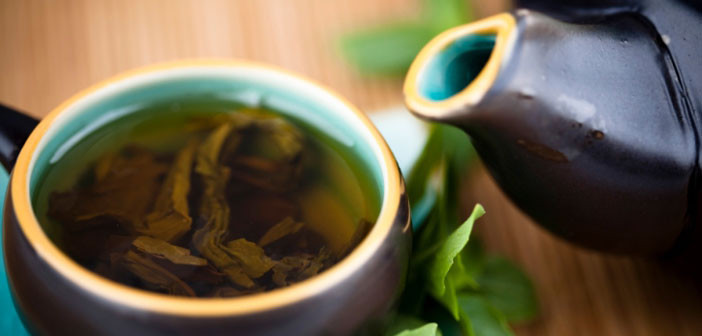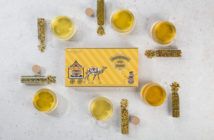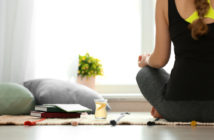note that this article was previously published on August 26th, 2014
Find the right tea to soothe yourself, body and soul.
As the legendary eighth-century tea master Lu Yu, author of The Classic of Tea , put it: “Tea tempers the spirit and harmonizes the mind, dispels lassitude and relieves fatigue, awakens thought and prevents drowsiness.” Modern-day tea aficionados agree. “In the midst of the rush of everything that can happen in a day, taking the time to drink a cup of tea is a delight for both the mind and the body,” says Aurélie Bessière, head of the US branch of the Parisian tea school Le Palais des Thés.
Tea brewed from the dried and sometimes fermented leaves of Camellia sinensis contains polyphenols and flavonoids—antioxidants with a beneficial effect on health. Certified tea master Jennifer Goldin says epigallocatechin gallate, an antioxidant found in white, green, oolong, and black teas, is 100 times as effective as vitamin C and 25 times as effective as vitamin E in fighting free radicals and protecting healthy cells from damage. Goldin points to research from Pace University that suggests tea can even fight viruses and bacteria and help prevent diarrhea, pneumonia, cystitis, and skin infections.
Similarly, tisanes (infusions of flowers, herbs, spices, or twigs) can also augment a healthy lifestyle. “People have been brewing up fragrant pots of herbs in hot water since prehistoric times, expanding on their knowledge of flavors and medicinal qualities over the years,” says Sharon Palmer, a registered dietitian and author of The Plant-Powered Diet . “And now scientists are discovering that herbal teas—made from plants as diverse as hibiscus, chamomile, and mint—possess significant antimicrobial, antiviral, antioxidant, and antitumor actions that may protect us from disease.”
Download our free Wellness & Tea 101 E-Book
Health considerations aside, what should you sip when you need a pick-me-up or just want to relax? Some of the country’s top tea experts offer their suggestions.
Rejuvenate
Jennie Ripps, founder of The Teaologist, a custom blender, suggests white teas for an extra boost. “White teas are slightly higher in caffeine than green teas but low enough to allow you to sip without the jitters,” she says. If you want more punch, Ripps advises adding vanilla or chai spices (ginger, cardamom, cloves) to white tea.
Relax
A calming tisane can be the perfect way to relax mind and body. Ripps’s favorite calming blends are chamomile with lavender (both flowers promote relaxation) and rooibos with lemongrass—it will soothe you, she says, but won’t make you sleepy.
Energize
To get your body going, try black tea with chai spices, says Ripps, since those are naturally energizing. Tea master Goldin agrees, adding that black tea contains the amino acid L-theanine. “This amino acid boosts alpha brain waves that promote relaxed states of concentration and can boost energy without increased stress levels.” Try adding cinnamon to boost your metabolism, cayenne pepper to heighten energy (and cleanse the body), dandelion to stimulate bile production, nettles to increase detoxification, and wild alfalfa to alkalize food residues in the body. All of these, says Goldin, reduce the malaise-inducing effects of inefficient bodily functions.
Ease Digestion
Of course, the health benefits of teas and tisanes depend on what is brewed. For instance, Goldin says, gingerroot, brewed by itself or with your tea, can soothe an upset stomach, and brewing mint will help digestion.
For centuries, people have been drinking tea and deriving its benefits for mind, body, and spirit. “It’s a healthy habit. Kick the bottle—the soda and sweetened beverage bottle, that is—and drink tea all year long,” says Palmer.—MONICA BHIDE
A Tea Ritual
Tea rituals are essentially active meditations, says Corinne Trang, author of The Asian Flavors Diabetes Cookbook . Here she offers a simple practice to help you create your own tea ritual. “I offer a warm cup of tea to anyone who visits. It is my way of saying welcome,” she says.
Start with warming the teapot and teacups with hot water. Pour out the water.
Add a heaping teaspoon of loose tea leaves to the teapot followed by hot water.
Steep the tea for no more than two minutes before pouring it into cups. A quality tea need not be steeped too long to become flavorful.
Pour the tea into your guest’s cup before your own.
Throughout the process, set a positive intention directly related to the person visiting. In your mind, quietly wish your guest the best in whatever he or she happens to be experiencing at the moment.
This article was first published by Spirituality & Health. To view the original article, click here.




